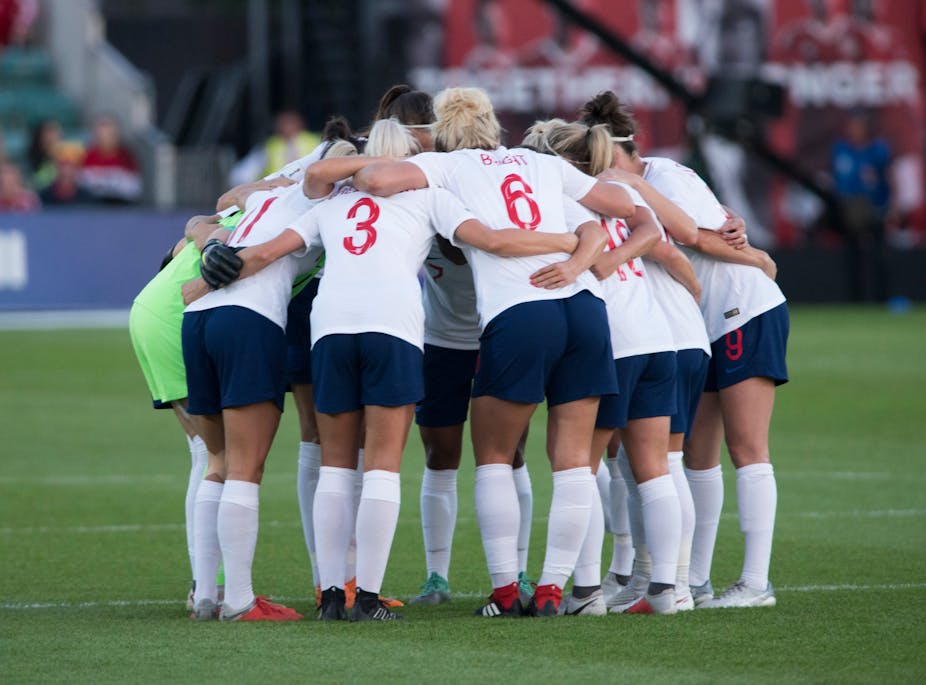Women’s football and its players have been marginalised, ostracised, discredited and silenced for decades. More recently however, the momentum, performance quality and actions of players, fans and activists has given it a louder voice.
The deafening roar of the Lionesses, after becoming European champions in 2022, rang out across the world. In March, the government responded by pledging to invest £600 million into equal opportunities for school sport. And in May, Chelsea and Manchester United played in a sold out Wembley Stadium for the Women’s FA Cup final. So, now what?
On July 13, the Department for Culture, Media and Sport released a “landmark review” into women’s football, chaired by sports journalist and former professional footballer Karen Carney. The review, entitled: raising the bar – reframing the opportunity in women’s football has been eagerly awaited by academics, sports organisations, sports media, football fans, players and coaches alike.
The review followed a recommendation made by the fan-led review of football governance (2021) and investigation began in September 2022. This latest review seeks to lay out “a plan to lift minimum standards in key areas”, acknowledging that there are imbalances across levels and clubs.
The resulting 128-page report centres on four areas: corporate structures, professional setup, fans and grassroots football. The ten recommendations are detailed and challenging, illustrating the highly intersectional and complex composition of football.
What the report recommends
Firstly, women’s football needs more investment. This first recommendation emphasises this in relation to sustainability, competitiveness and infrastructure. In particular, to provide freedom to NewCo (the new professional league infrastructure) to make its own decisions.
Points 38-40 of the review draw upon the need for equal FA Cup prize money across men’s and women’s teams and to provide greater central revenue resources for smaller clubs.
It is noted, however that this recommendation is “problematic”. This is due to differences in the number of teams and rounds involved. Nonetheless, commitment to equal prize money is highlighted as a significant requirement.
Other recommendations relate to improving the talent pathway and ensuring full professionalisation of the Women’s Super League and Women’s Championship. Specifically, the focus on parental rights in football is much needed. The rights of mothers have previously been overlooked both in policy and practice. Fifa only established global minimum standards for maternity leave for footballers in 2020, with the Professional Footballers’ Association union following suit in 2022.
A fourth recommendation challenges the lack of diversity in women’s football.
Also, a dedicated broadcasting space for women’s football is recommended, along with a need to take better care of fans. The report calls upon the government to uphold its commitment to equal opportunity for girls in school sport and demands more investment for grassroots football, as well.
Finally, the report urges more collaboration between the FA, Premier League and the Football Foundation to ensure facility funding is transparent.

Implementing the recommendations
This review can be understood in terms of two broad, but philosophically simple themes: resource and respect.
Women’s football is playing catch up. The ban on women playing on affiliated pitches for 50 years has taken its toll on progression. The tangible removal of that barrier in the 1970s, however, was not followed by a lifting of the social and cultural stigma and resistance to girls and women playing football.
There will be challenges for implementing the recommendations of the review. The most formidable will be addressing the wider social imbalances that women’s football is embroiled in.
My work on women’s football uses the idea of gender justice (a companion of social justice acknowledging that gendered inequalities have economic, political and social significance) to challenge existing inequalities and bridge the gap between sport and society.
There is a pressing need to address wider social inequities that intersect with sport and gender more broadly. Issues of representation and a need for transparency to facilitate an open culture are referenced within the review and these can be built upon further to directly challenge the social fabric in which football is embedded.
There may be resistance to these recommendations from those in privileged positions (as already seen in relation to recreational sports clubs), but perseverance is key. It is important that players, fans, pundits, coaches, managers, sponsors, broadcasters and journalists alike roar as one for women and their right to play professional football in a professional environment.

Looking for something good? Cut through the noise with a carefully curated selection of the latest releases, live events and exhibitions, straight to your inbox every fortnight, on Fridays. Sign up here.

